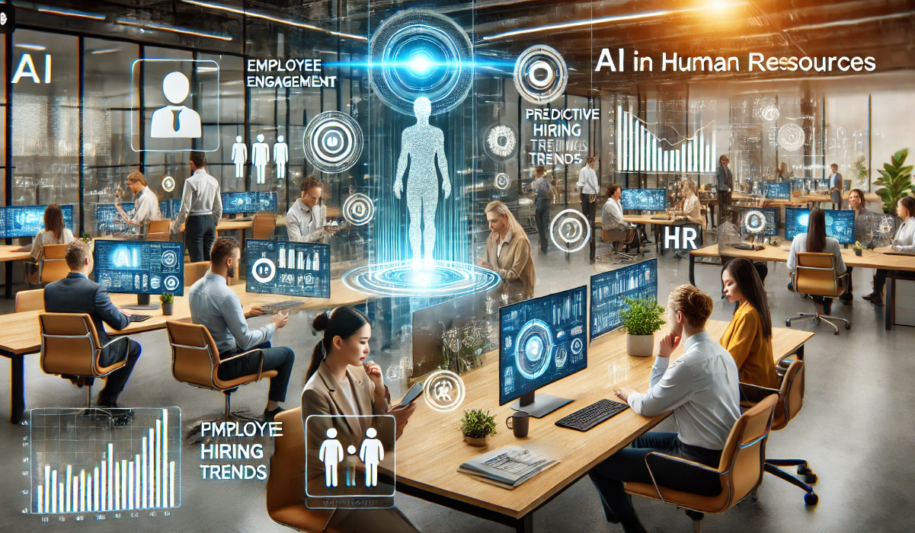Artificial Intelligence (AI) is reshaping industries across the board, and human resources (HR) is no exception. From recruitment to employee engagement and performance management, AI offers transformative solutions that streamline processes and enhance decision-making. HR professionals can leverage AI to automate repetitive tasks, provide personalized employee experiences, and make data-driven decisions that enhance efficiency and employee satisfaction.
In this blog, we’ll dive into how AI is influencing HR practices, particularly in recruitment, workforce management, and employee engagement.
1. AI in Recruitment and Talent Acquisition
One of the most significant impacts of AI in HR has been in recruitment. Traditional hiring processes are often time-consuming and require significant manual effort. AI, however, is revolutionizing talent acquisition in the following ways:
- Automated Resume Screening: AI-powered systems can scan thousands of resumes, filtering them based on keywords, skills, and qualifications. This process not only saves time but reduces the risk of bias by evaluating candidates solely on their qualifications.
- Predictive Hiring: AI can analyze vast amounts of data to predict a candidate’s suitability for a role. By examining past performance, skillsets, and even cultural fit, predictive algorithms improve the likelihood of hiring candidates who will excel in their positions.
- Enhanced Candidate Experience: Chatbots are increasingly being used to communicate with candidates, answer common questions, and guide them through the application process. This creates a smooth and responsive candidate experience, reflecting positively on the employer brand.
Career Creed’s Role: Career Creed’s HR solutions can help companies implement AI tools that streamline their recruitment process, from resume screening to candidate engagement, ultimately leading to faster and more accurate hiring decisions.
2. Workforce Management and Productivity Tracking
Beyond recruitment, AI also plays a crucial role in workforce management, offering tools that help track productivity, allocate resources, and support efficient scheduling.
- Employee Monitoring and Productivity Tools: AI-driven tools allow HR managers to track productivity and gain insights into employee behavior. With data on work patterns, HR can make informed decisions about workload distribution and identify employees who may need additional support.
- Data-Driven Scheduling: AI solutions can automate scheduling based on historical data, ensuring optimal coverage and efficiency. For industries like retail or healthcare, this reduces human error and minimizes scheduling conflicts, improving operational efficiency.
- Resource Allocation: AI can predict when additional resources are needed, particularly during peak seasons or in high-demand projects. This helps HR ensure that teams are neither overburdened nor underutilized.
Career Creed’s Role: Career Creed assists businesses in adopting AI-driven workforce management tools, helping clients optimize productivity and support a balanced work environment.
3. Enhancing Employee Engagement and Retention
Employee engagement and retention are critical components of HR, and AI provides tools to understand and improve them effectively.
- Personalized Employee Experiences: AI can analyze data from employee interactions to personalize the employee experience, from recommending training programs to suggesting internal job roles aligned with career growth.
- Predictive Analytics for Retention: Using predictive analytics, AI can identify employees who may be at risk of leaving by analyzing indicators such as engagement levels, work patterns, and feedback. This allows HR teams to proactively address issues and improve retention.
- Sentiment Analysis: AI-driven sentiment analysis can assess employee mood and morale by analyzing communications and feedback. HR can then implement changes based on this data, creating a responsive and supportive work environment.
Career Creed’s Role: Career Creed offers expertise in implementing AI tools that monitor and enhance employee engagement, creating workplaces where employees feel valued and motivated.
4. The Ethical Considerations of AI in HR
While AI brings numerous benefits, it also raises ethical concerns. HR professionals must ensure AI tools are transparent, unbiased, and respectful of employee privacy.
- Bias and Fairness: AI systems can inadvertently carry forward biases if trained on biased data. It’s crucial for HR to regularly audit AI systems and ensure fair outcomes in hiring and employee evaluation.
- Data Privacy: AI systems require access to vast amounts of employee data, which could lead to privacy concerns. Implementing strict data governance policies can help protect sensitive information.
- Transparency: Employees may be wary of AI monitoring tools. Clear communication about the purpose and benefits of these tools can help build trust and acceptance.
Career Creed’s Role: Career Creed can support businesses in implementing AI ethically, ensuring compliance with data protection regulations and fostering a transparent work environment.
5. Preparing HR Teams for AI Integration
As AI continues to shape HR practices, HR teams must be prepared to leverage these technologies effectively. Key steps include:
- Continuous Learning and Development: HR professionals need training in data analytics, machine learning basics, and ethical AI practices to make the most of AI tools.
- Collaboration with IT: Successful AI integration requires close collaboration between HR and IT departments, ensuring that AI tools are well-aligned with organizational goals and technological capabilities.
- Adapting to Change Management: Adopting AI means changes in workflows and responsibilities. HR leaders should implement change management strategies to ensure smooth transitions and employee buy-in.
AI is undoubtedly transforming the HR landscape, offering tools that enhance recruitment, workforce management, and employee engagement. By leveraging AI, HR professionals can make data-driven decisions, streamline processes, and provide a better employee experience. However, it’s essential to approach AI with caution, prioritizing ethical considerations and data privacy to build a future where AI serves as a valuable ally in HR.
At Career Creed, we’re dedicated to helping businesses harness the power of AI in HR while maintaining ethical standards. Contact us today to learn how our HR solutions can support your organization’s growth and transformation in an AI-driven world.

Leave a Reply